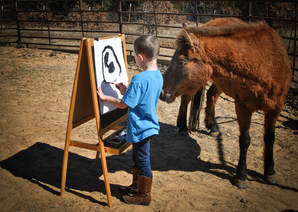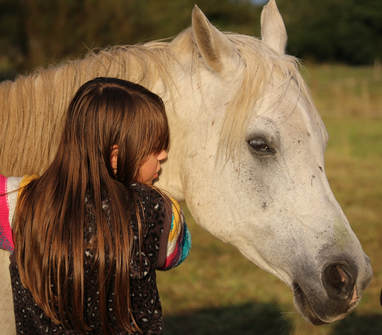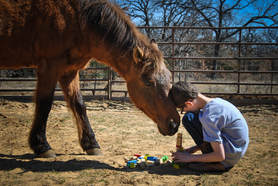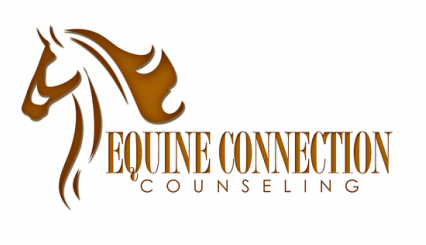
Many different children come to us for play therapy. Some children come because they’ve experienced trauma and need a safe place to process their experiences. Other children find themselves feeling sad or worried much of the time. Many of these children struggle in their relationships with friends, family, teachers, and others. While some children may act aggressively, others may hide their true feelings. In order to help children struggling with these issues as well as many others, we use Equine-Partnered Play Therapy. By integrating miniature horses into play therapy, children are able to learn ways to feel happier with themselves and in their relationships with others. Read on to get a closer look at the top 3 things children can learn by playing with horses.
1. Empathy
In order to successfully work with horses, a child must first have empathy. That means the child must be able to understand someone else’s feelings from that person’s (or horse’s!) perspective. Sam came to play therapy to work on reducing his anger and improving his social skills. He frequently bullied and taunted other kids at school and, as a result, did not have many friends. During the first few weeks of play therapy, Sam would often try to startle or “trick” the horses and was confused when the horses moved away from him and wouldn’t let him get close. Over time, Sam began to see that his “bullying” of the horses influenced their response to him. Sam began to notice that the horses responded differently when he approached them calmly and quietly. Over time, Sam was able to connect the horses’ behaviors to their likely feelings. When Sam startled the horses, he surmised that they might feel scared. However, when he approached them calmly, they felt safe. Sam’s parents saw similar changes in his interactions with his classmates and he started getting invitations for playdates.

As horse people all over the world will tell you, a horse can tell right away whether or not you’re confident around them. In order to convince a horse to allow you to be the leader, you must feel truly confident in what you want and what you’re telling the horse to do next. Jenna came to play therapy because she often felt very anxious around her peers. Jenna rarely spoke in school for fear of saying the wrong thing and being made fun of by her classmates. Over the course of play therapy, Jenna gradually became more confident in her ability to lead the horses. She learned that in order to walk the horses (instead of the horses walking her), she would need to decide what she wanted to take the lead in showing the horse. As a result, Jenna’s confidence grew enabling her to start raising her hand in class and take on leadership roles in small group projects.

Many children struggle with the ability to control themselves when faced with strong emotions and difficult situations. Oftentimes, the feelings can be so overwhelming that children don’t always have the internal resources to manage these feelings, which can result in tantrums and outbursts. Jason came to play therapy to work on his disruptive behaviors and tantrums, often in response to frustration or being told “no.” Jason was very interested in the horses and tried to find ways to integrate them into much of his play. Despite Jason’s best efforts, the horses did not always play along – at least not the way Jason wanted them to. While at first Jason would get mad and call the horses “stupid,” over time Jason began to notice that the horses often moved away when he became frustrated. He learned that in order for the horses to feel safe, he would need to be calm. Jason began to catch himself when becoming upset and use coping skills to calm both himself and the horses, allowing them to continue their play. Jason’s parents soon noticed that Jason began taking “time-outs” for himself to calm down and was able to express himself more clearly and calmly rather than throwing a tantrum when he did not get his way.
Equine-Partnered Play Therapy is a unique model for counseling young children.
If you’re interested in learning more about our services for your child, please feel free to call us at 682-334-3784.
For mental health and/or equine professionals interested in facilitating EPPT: We periodically schedule EPPT trainings. Check out www.equineconnectioncounseling.com/trainings to attend our next training!

 RSS Feed
RSS Feed
